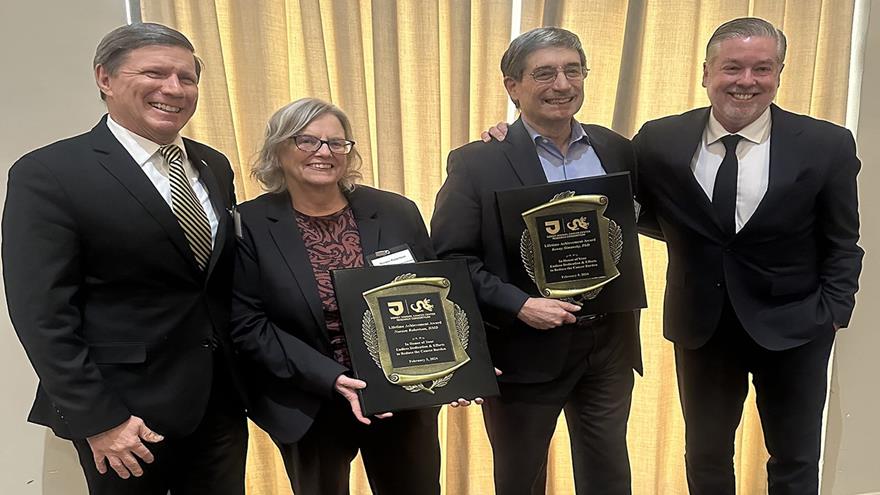Drexels Dr Joseph Mason to Testify Before US House Subcommittee on Subprime Lending
September 27, 2007
Related

- Bolstered by Research Consortium with Drexel, Jefferson’s Sidney Kimmel Cancer Center Earns NCI Comprehensive Cancer Center Designation
- No link between acetaminophen use during pregnancy and children's autism risk
- Drexel Recognizes Gregory E. Deavens, CPA, CGMA as Business Leader of the Year
- $15 Million Gift from Howley Foundation Expands Drexel Scholarship Program for Local Graduates
Dr. Joseph Mason, associate professor of finance at Drexel University’s LeBow College of Business, will testify today before the U.S. House Subcommittee on Capital Markets, Insurance, and Government Sponsored Enterprises at 2 p.m. in the Rayburn House Office Building. The hearing will address the role of credit rating agencies in the structured finance market. “This hearing will examine a number of questions related to assessing the credit quality of complex financial instruments, understanding the conflicts of interest of NRSROs (Nationally Recognized Statistical Rating Organizations), and reviewing the role of NRSROs in developing new debt products,” Rep. Paul E. Kanjorski (D-PA), chairman of the House Subcommittee, said in a released statement. “We will also study the transparency of NRSRO criteria for evaluating structured products, and evaluating the timeliness of recent decisions to downgrade the ratings of many MBS and CDO products backed by subprime mortgages.”Mason is an internationally renowned expert on the impact of subprime mortgage lending. His academic research papers, “How Resilient Are Mortgage-Backed Securities to Collateralized Debt Obligation Market Disruptions?" and “Where Did the Risk Go? How Misapplied Bond Ratings Cause Mortgage Backed Securities and Collateralized Debt Obligation Market Disruptions”, co-authored with Joshua Rosner, managing director, Graham Fisher & Co., accurately predicted the broader economic effects of the slumping housing industry. “Many are tempted to characterize the current market conditions as a bursting of a classic asset bubble,” Mason writes in his prepared testimony. “The central question, however, is not whether recent market conditions were a bubble, but why markets are in their current state of turmoil despite very favorable Federal Reserve rate cuts and a variety of other measures.”Mason served three years in the Office of the Comptroller of Currency studying structured finance and has offered advice to banks, securities market regulators and industry groups on the recent difficulties of structured finance. He has been quoted in national and international publications and has appeared on various television and radio news programs addressing the subprime crisis. Mason will report that “Market participants recently discovered that someone else knew a lot more than they did. Investors need more information about the value and the holdings of structured products. No Fed funds rate cut, increased agency mortgage limit, FHA program, or even (as in the UK) blanket deposit insurance coverage, will resolve that information problem.”He will further explain how conflicts of interest in NRSROs contribute to investors being uninformed. NRSROs are paid by those they rate; and, Mason contends, NRSROs claim that they are protected by free speech and bear no responsibility for accurately reporting risk. He further demonstrates that during the recent credit crunch, NRSROs were late in downgrading the ratings of residential mortgage-backed securities and collateralized debt obligations. Mason asserts that the current economic crisis was caused by the lack of foresight in financial engineering rather than subprime lending. “New and complex debt products need simple funding structures, but the NRSROs simply rated the new instruments like old corporate debt.”At the hearing, Mason will suggest that “Much needs to be done to effectively increase transparency and liquidity in what is now a crucially important structured finance sector. Ensuring ratings are both valid and transparent and that they are changed promptly over time with credit quality will begin to reduce information differences, prospectively.“Existing securities need to be rerated so that investors can get on with evaluating risk and making appropriate investment decisions in today’s markets while regulators and legislators develop a unified approach to structured finance that can carry markets into the future without unnecessary interruptions.”Also testifying at the hearing will be H. Sean Mathis, managing director, Miller Mathis; J. Kyle Bass, managing partner, Hayman Capital; Mark Adelson, Adelson-Jacob Consulting; Michael Kanef, group managing director, Asset Finance Group, Moody’s Investors Services; and Vickie Tillman, executive vice president, Credit Rating Services, Standard & Poor’s. To view the hearing live and to read the panel’s testimony in their entirety, visit the U.S. House Financial Services Committee at financialservices.house.gov/hearings_all.shtml. You may also view Mason’s testimony at www.lebow.drexel.edu. ABOUT DREXEL UNIVERSITY’S LEBOWCOLLEGE OF BUSINESS Recognized by Entrepreneur, Financial Times, Forbes/The Princeton Review and U.S.News & World Report for superior programs, Drexel University’s LeBow College of Business empowers, enriches and inspires future business leaders through an innovative, strategic approach to business education defined by leadership and ethics, industry perspectives and technological orientation. Founded in 1922, LeBow College has more than 3,300 students, 100 faculty and 30,000 alumni and is accredited by AACSB International-The Association to Advance Collegiate Schools of Business. It offers undergraduate, graduate, doctoral and executive education programs. For additional information, visit www.lebow.drexel.edu.For more information: Contact Richard Barnes in LeBow College of Business, 215.895.2075, richardb@drexel.edu or Jennifer Corey at 215-895-2126, jmc75@drexel.edu.
In This Article
Drexel News is produced by
University Marketing and Communications.
now.editor@drexel.edu
For story suggestions or to share feedback
now.webmaster@drexel.edu
For questions concerning the website, or to report a technical problem